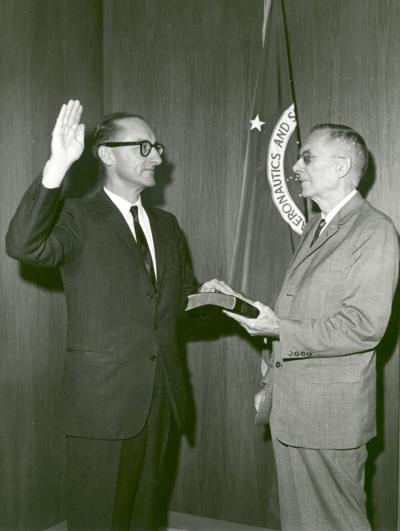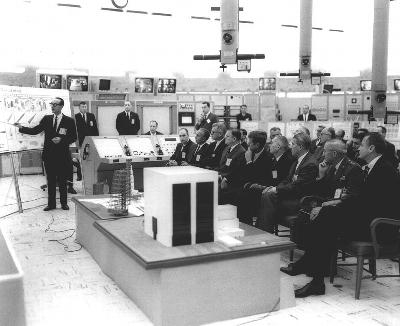Passed Away Last Week Following A Short Illness At The Age Of 97
The leader of NASA’s human spaceflight programs in the tumultuous 1960s, Dr. George E. Mueller died on Monday, October 12, 2015, after a short illness. Mueller effectively created, and headed, the Office of Manned Space Flight at NASA Headquarters (now the Human Operations and Exploration Mission Directorate) from 1963-1969. He was responsible for overseeing the completion of Project Apollo and of beginning the development of the Skylab and the Space Shuttle projects. During his six years of service at NASA, Mueller introduced a remarkable series of management changes within the agency during a time when strong leadership and direction were critical to achieving success on a set of extraordinary goals.

Originally sworn in as the Deputy Associate Administrator for Manned Space Flight on September 1, 1963, he quickly pushed through a reorganization that changed his title to Associate Administrator for Manned Space Flight, a position he held until leaving the agency in 1969. In this new management structure, Mueller was not only in charge of the Gemini, Apollo and future human space flight programs, but directly supervised the three NASA Centers devoted to human space flight: Marshall Space Flight Center, the Manned Spacecraft Center (now the Johnson Space Center), and the Kennedy Space Center. At the time, all three of these Centers were undergoing a massive growth in facilities and staff. Mueller, a no-nonsense, forward-thinking leader introduced management concepts and practices that not only assured the achievement of landing on the Moon by the end of the decade, but also had a long-lasting impact on NASA.
In his six years at NASA Mueller’s impacts were far-reaching, from accelerating Project Gemini, to pushing forward initial designs for Skylab, and laying the groundwork for the Space Shuttle. However, he is probably best known for his daring solutions to the schedule problems in the Apollo Program. Knowing that the plans he inherited in 1963 would never succeed in achieving the Presidential goal of a Moon mission by the end of the decade, Mueller overhauled the management system to facilitate concurrent development of the many needed systems. Most importantly, and most controversially, Mueller instituted the “all-up” testing approach. This approach was a radical change to the building block approach then in use, and vigorously defended by Wernher von Braun and his team developing the Saturn V rocket. But, Mueller insisted that testing each stage of the Saturn rocket before adding the next was not necessary and would be impossible to complete by the end of the decade. Mueller’s
logic carried the day, and his calculated risk proved critical in achieving President Kennedy's goal of landing on the Moon before the end of the decade.

Mueller was born in St. Louis, MO, on July 16, 1918. Trained as an electrical engineer, with a B.S. from the Missouri School of Mines (1939) and M.S. from Purdue (1940), Mueller served as a researcher at Bell Telephone Laboratories during World War II. After the war he taught at Ohio State University, while completing his Ph.D. in physics (1951). By the mid-1950s he was consulting with major aerospace companies and quickly rose to management positions of space programs at the Space Technology Laboratories (STL), a division of TRW, Inc. He was serving as Vice President, Research and Development, for STL when NASA hired him in 1963. In 1969, after the success of Apollo 11, Mueller returned to industry where he had a long and distinguished career. He was also active in, and served as a leader in, a number of professional societies. His many awards and honors include three NASA Distinguished Service Medals and the National Medal of Science (1970).
Mueller is survived by his wife, Darla, his son Bill Schwartzman, and his three daughters, Karen Hyvonen, Jean Porter and Wendy Schwartzman, and also by his 13 grandchildren and 13 great grandchildren.
(Source: NASA. Images provided by NASA. Top: George E. Mueller being sworn in, as Associate Administrator for the Office of Manned Space Flight for NASA, by Hugh Dryden, NASAs Deputy Administrator. Bottom: George Mueller briefs President John F. Kennedy and other officials on the Saturn V rocket)
 ANN's Daily Aero-Term (04.26.24): DETRESFA (Distress Phrase)
ANN's Daily Aero-Term (04.26.24): DETRESFA (Distress Phrase) Aero-News: Quote of the Day (04.26.24)
Aero-News: Quote of the Day (04.26.24) ANN's Daily Aero-Term (04.27.24): Direct
ANN's Daily Aero-Term (04.27.24): Direct ANN's Daily Aero-Linx (04.27.24)
ANN's Daily Aero-Linx (04.27.24) Aero-News: Quote of the Day (04.27.24)
Aero-News: Quote of the Day (04.27.24)




